- Home
- Cheryl Bolen
Last Duke Standing Page 4
Last Duke Standing Read online
Page 4
“Perhaps Mrs. Langston was devastated that Freddie was leaving her to marry me.”
“That sounds plausible.” Alex wrote down the actress’s name with a question mark beside it. “It’s not unheard of for a duke to offer marriage to an actress. Perhaps the woman had aspirations of becoming a duchess.”
“There’s also the possibility that one of Lady Georgiana’s spurned lovers wanted to clear the Duke of Fordham from standing in his path.”
She laughed. “I have no spurned lovers.”
“Not true, my lady,” Sinjin said. “I was witness to your vast success the season you came out. I can attest that men numbering into the dozens wished to claim your hand in marriage. Can you refute that?”
“I cannot, but I stand behind my statement. I have had no lovers.”
“But what of persistent suitors?” Alex asked.
She did not respond for a moment. “You have me there. A few men have stubbornly refused to concede that they’ve been unable to claim my dowry.”
“You modestly discount your own charms, my lady,” Alex said. “Would any of these stubborn men be on this list, my lady?”
She hesitated. “Lord Hickington, actually, but the man would not kill for a mere twenty thousand.”
“My dear lady,” Sinjin said, “I beg you not say mere twenty thousand.”
“Men have killed for much less,” Alex said.
“It’s not as if I’ve even seen Lord Hickington since I became betrothed to your brother.”
“Still, it’s something to consider. What other motives can there be?” Alex asked.
“Revenge. Retaliation,” Sinjin offered.
“I know of no one who might have had a grudge against my brother,” Alex said, eying her. “Do you?”
She shook her head. Then a moment later, she held up her hand. “There was something he felt terribly guilty over. . .”
“What?” Alex asked.
“The death of his coachman’s lad. Freddie feared it may have been his bullet that killed the boy.”
Alex’s gut plummeted. Freddie had never admitted that to him. Poor Freddie. Poor John. No father had ever been more devoted than John Prine was to his lad. What a terrible loss it had been. With anguish, Alex picked up his pen and wrote down the coachman’s name.
“What else are we missing?” Sinjin asked. “What other motive?”
“Jealousy,” she said. “Although I’ve always thought only mentally deranged persons would kill for jealousy.”
“I would agree with you,” Alex said.
She regarded him with twinkling eyes. “So you are in agreement with me and it didn’t emasculate you?”
He chuckled heartily. This woman could read him entirely too thoroughly.
“Back to this jealousy theory,” Sinjin said. “There’s a fine line between that and love. Spurned lovers and all of that.”
“But there are other kinds of jealousy,” Alex pointed out. “For example, it would only be normal if Lord Pomfoy, Freddie’s best friend, were jealous of my brother. Freddie was heir to a vast estate and could have anything his heart desired. Pomfoy’s estate is considerably smaller.”
“And your brother was handsome, whilst his friend is not in the least,” Sinjin added.
Lady Georgiana smiled. “You could hardly expect Fordham to admit his brother was handsome, given that the two brothers so vastly resembled one another.”
He’d been stunned she, too, had slipped into calling him Fordham. It must have been painful for her. He masked his surprise with a playful retort. “I take it, Lady Georgiana, you found my brother handsome.”
“I refuse to answer. I shouldn’t want to further inflate the ego of the new duke who’s infamous for his female conquests.”
In spite of her words, he realized the stiffness that had stood between them like an iron wall was melting away. He dismissed her comment about his flirtations. “So, are we saying it’s possible Lord Pomfoy could have murdered my brother out of pure jealousy?”
The other two shook their heads. “Not probable. Unless he were a mad man, and I find that unlikely,” Sinjin said.
“Not to mention I’ve known him most of my life, and he’s a fine fellow,” Alex said.
“Anything else?” Sinjin asked. “Anyone else?”
Alex shook his head. “I can’t think of anything. Tomorrow, we’ll return to London and start making discreet inquiries—after I break the wretched news of Freddie’s death to my sisters.”
“I’m coming to London, too,” Lady Georgiana said. “I’ll bring Freddie’s correspondence to sort through whilst I’m there. Perhaps my presence might help when you speak to your sisters. I’m quite close to them.”
Alex had hoped he’d seen enough of Lady Georgiana. “You will leave your mother?”
“No. I’ll see to it she also comes to London. She needs a break from her grandchildren. They are ill-behaved monsters.”
How could one speak of her own nieces and nephews in such a manner? What a paradox Lady Georgiana Fenton was. Large doses of vinegar with a dollop of honey.
Though he did not fancy spending more time with his brother’s affianced, her presence might make it easier to break the sorrowful news to his sisters.
Chapter 4
Lady Georgiana Fenton was singular indeed. No other woman of Alex’s acquaintance could rush off to the Capital without spending days overseeing the packing of portmanteaus heaped with gowns, hats, shoes, and gloves for every purpose. Yet this lady had no qualms about setting off in his carriage with only the single valise she’d brought to Gosingham—and two bulging valises of Freddie’s correspondence. She still wore that faded muslin dress his sisters wouldn’t think suitable to give to a servant. He was vaguely aware of the scent he’d come to associate with her. Roses.
The lady expressed full confidence in her maid’s ability to pack her trunks back at Alsop and in her mother’s competent maid to see that the marchioness’s journey to London in a few days’ time was as smooth as French satin.
After the lady, Alex, and Sinjin were settled in the coach for the long trip, she said, “This is the first time I’ve been away from Mama since her affliction.”
Alex was not pleased that he would have to share his carriage with her. A pity she hadn’t returned to Alsop to oversee her mother’s and her own preparations for London. “Your mother won’t mind having to travel all the way to London alone?” he asked.
“She won’t be alone. Emma—her maid—is extremely capable. Mama’s had her ever since she was a bride.”
“And it has been over a year since your mother fell ill,” Sinjin said. “It’s time to give her some independence.”
The lady nodded. “I agree. And I think London will be good for her.”
“Get her away from the monsters,” Alex said with a wink.
“If you just looked at my niece and nephew, you would believe them cherubs, but they have most assuredly earned the description of hellions through no fault of their own.”
“Whose fault then?” Sinjin asked.
“The present marchioness indulges them exceedingly. They are permitted to do anything they wish. I daresay if they wished to wallow in a pig sty, their witless mother would be most agreeable.”
“Then you and your mother will most certainly enjoy getting away,” Alex said. “You’ll stay at Hartworth House in London?”
“Yes, we sent a courier to London to notify the staff there.” She pulled from her bag a book. “If you gentlemen wish to speak about Parliament or other manly things, go right ahead. I shan’t be disturbed. I’ve brought my own diversion.”
Sinjin shook his head and stared at her with disbelief. “The motion doesn’t make you ill when you read in a carriage?”
“Not at all.”
A most singular woman, to be sure.
* * *
When night fell they stopped at an inn for dinner and a clean bed. As inns went, the three-story Howling Dog was large. It was tucked right in the m
idst of the thriving market town of Stanbury. Alex’s servants had provided clean linen for the three of them. A hot dinner was so promptly served in his private parlor, he suspected his servants had thrown around his new ducal title.
Their female companion had hardly spoken during the day’s long journey, so engrossed had she been in her book. “Pray, my lady, what book has captured your attention so thoroughly?” Alex asked once they sat down to dinner.
She put down her glass and eyed him across the small oak table. The blazing fire to her back perfectly framed her, her dark tresses giving off reddish glints. He was struck by how disarranged her hair was. Now he understood the value of a lady’s maid.
“I was reading the memoirs of the late Lord Chatham,” she answered. “I know they’re old, but my Papa had enjoyed them as a young man.”
“A pity Lord Chatham’s son did not live long enough to write his,” Alex said. “How old was he when he died?” He eyed Sinjin. “We were at Eton when he died so unexpectedly.”
“William Pitt the Younger died at forty-six,” Lady Georgiana answered.
“Sinjin, Wycliff, and I actually heard him address Parliament when we were students,” Alex said. “He was a superior orator—though, of course, none of us were inclined to agree with him.”
She wrinkled her nose in distaste. “Because you’re Whigs.”
Alex nodded.
“My father was and my brother is a staunch Tory. Perhaps that’s why I was drawn to read about the elder Pitt,” she said.
This was the first time since he’d met her that he really looked at her face, and to his astonishment, he realized she was beautiful. He’d originally dismissed her on the basis of her darker colouring and lack of bosom. Now, though, he found her large dark eyes framed with long lashes uncommonly expressive. If her lashes dipped while she was speaking, he found it seductive. He found himself watching her mouth, admiring her perfect teeth. Did they appear whiter than others’ because her complexion was darker? His gaze feathered over the features of her flawless face. And now he understood how Freddie had become bewitched by her.
“It would probably be best if we don’t speak on political matters, my lady,” Sinjin said with a grin.
She smiled at Sinjin. “I can see that you’re the peacemaker. No wonder you have a reputation as the great compromiser in Parliament.”
“You’re rather well informed—for a lady,” Alex said.
She bristled. “You did not have to qualify your remark. I should like to be well informed without regard to gender.”
Alex directed his attention at her. “I don’t know you well enough to determine if I could make that statement without a qualifier.”
“I don’t know you well enough to determine if I can make this statement with certainty, but I do believe you are honest.” she said.
The three of them broke into laughter. They kept up a lively banter as they ate their fowl and turnips and washed them down with ale. By the time they finished, Alex walked her to the chamber next to his. “I thought you’d feel safer if you knew Sinjin and I are close—should you need us for any reason. I know it’s beastly difficult for a lady to travel without even her maid.”
“That’s very kind of you. I will own, I was a bit ill at ease about sleeping alone in a strange place.”
He took her gloved hand and brushed his lips across it. “I bid you a good night, my lady.”
As she strode into her chamber, he said, “Don’t forget to lock your door.”
His valet, Gates, awaited him and helped him dress for bed. His bed, warmed by the fire blazing nearby, was comforting. Folded up for hours on end in a cramped coach was more exhausting than a punishing workout with Jackson. He went immediately to sleep.
* * *
Because the roads were good and the weather free from rain, they were able to easily cover two-thirds of the journey during the first two days.
Then snow began to fall. Georgiana buried herself beneath the woolen rug. Her hands were so cold, she was forced to forgo reading Lord Chatham’s book.
“Would that I could offer a warm fire, my lady,” the Duke of Fordham said, an apologetic look on his face.
“A fire would be a very good thing right now, your grace. In fact, I shall console myself with thoughts of standing before the fire at Hartworth House. When do you expect to reach London?”
“If the snow doesn’t impede our progress—and it’s rare when a March snow does—we should arrive at nightfall,” Fordham said.
“Your three unmarried sisters are there?”
“Yes.”
“What about Lady Roxbury?” Lord Slade asked.
The duke grimaced. “I had the painful task of dispatching a black-bordered letter to her the day before we left Gosingham. Would that I could have told her in person.”
“I hated it when your sister moved to the far corners of Devon,” Georgiana said. Then, almost as an afterthought, she looked up at him. “You were in the Peninsula when she married, were you not?”
“I was.”
She shook her head. “It’s difficult to imagine a duke as a soldier.”
“It’s even more difficult for this old soldier to imagine himself a duke. It’s not something I ever contemplated.”
“But think about it,” she teased. “An army officer has much in common with a duke. Do they both not order about vast numbers of men?”
His face transformed, like sunshine after a storm, and he winked. “You do have a point, my lady.”
Even though this man had the most to gain from Freddie’s death, she was inclined to believe him when he said he’d never wanted to be a duke. His friend Lord Slade had assured her that Fordham was possessed of great character, and Lord Slade had known him well since they were young lads. Slade had a reputation in Parliament as a man incapable lying.
Of course, believing the new Duke of Fordham and trusting him were two different matters. This youngest of the Haversham sons was a known rake, a rake who was attracted to the type of women one never displayed in public.
And he was a Whig.
Thinking of the murder prompted her to ask, “How, your grace, do you plan to make inquiries about the possible murderers once we get to London?”
“I shall start at my brother’s club.”
“But you never go to White’s,” Lord Slade said.
“I must go where the Tories go.”
The features on Lord Slade’s face sharpened. “They’ll think your allegiance to the Whigs a casualty to your new rank.”
“They can think whatever they like. As committed as I am to the Whigs, I’m more committed to finding my brother’s killer. But . . .” He paused, his gaze fanning to her, then to Lord Slade. “The fact he was murdered stays with only the three of us.”
“What of Wycliff?” Lord Slade asked.
“Four of us,” the duke amended.
Lord Slade turned to her and explained. “Since we were lads at Eton, we three—Fordham, Wycliff and I—have shared everything.”
She nodded. “I have such a difficult time believing any of those men who came to Freddie’s shooting party could be capable of killing a man, a friend,” she said. “Surely it’s someone else. It’s the kind of thing a thief would do.” How foolish she was being. There was no evidence to support her statement, but it was painful—and frightening—to think the murderer might be someone she knew or someone from her own privileged class.
“Did you find out if . . . any females gained entry to Gosingham that night?” she asked. If only Mrs. Langston would be the murderer.
“No females came to Gosingham,” the duke said. The look Fordham gave her reminded her of stern Miss Masters, her much-feared governess. “Had I neglected to tell you that nothing was missing? That all the doors at Gosingham were secured that night—as they are every night?”
She bowed her head like a scolded school child.
“I do share you disbelief,” Lord Slade said to her. “It’s beyond my comprehension that
one of the previous duke’s friends could possibly have murdered him.”
She thought of the coachman, the very one who was up on the box right now. In his grief over his son’s death, could he have sought retribution with Freddie? The thought of coming face to face with him terrified her. “There is the coachman,” she said in a feeble voice.
The duke glared at her. “I refuse to consider him until all the others have been exonerated. He’s served our family all his life.”
The wind began to howl, and she gathered the rug closer in hopes it would warm her against this new assault. “Did it ever get this cold when you were in the Peninsula, your grace?” she asked.
“I never saw snow, but I certainly experienced winds much more chilling than this—and we had no carriages to provide relief. Some of my men went without winter coats after they’d been burned by gunpowder in battles.”
“And knowing you,” Lord Slade said, “you probably gave away your own coat to an injured soldier.”
The duke did not deny it. Her admiration for him grew. She recalled seeing a painting of him at the family’s London home in which he was dressed in his red Guards’ jacket, standing in his shiny black books, snowy white breeches and gleaming sword. How handsome he’d been. And still was.
Fordham eyed her with concern. “You look beastly cold. Should you like my coat? I assure you I’m accustomed to the cold.”
She was touched. “It’s very kind of you to offer, your grace, but the rug makes the cold tolerable. I do pity your poor coachman—all coachmen, really.”
“They are inured to the cold. Rains, I believe, make one more miserable,” the duke said.
Lord Slade emitted a mock shiver. “The worst is cold and rain.”
“And gusty winds,” she added.
The men nodded.
“Please,” she said with a laugh, “let us speak of roaring fires, cozy inns, or sunny days in Spain—anything but snow and fierce, cold winds!”
“How about Whig politics?” the duke said, a mischievous glint in his mossy coloured eyes, eyes that were so much like Freddie’s.
It was really remarkable how closely the two brothers resembled. Both were of muscular build with no great height, though they were considerably taller than she. Without being obvious, she studied him. His light brown-goldish coloured hair must have been blond when he was a youngster. Though it was the same shade as Freddie’s, his skin was less fair. Had his tan from the Peninsula last year not faded? Even though both brothers had fine aquiline noses and firm mouths set over a clefted chin, the younger brother’s expressions, even though he was in mourning, conveyed a natural playfulness that would have been alien in serious Freddie.

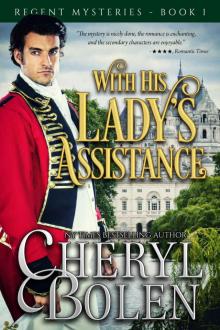 With His Lady's Assistance (The Regent Mysteries Book 1)
With His Lady's Assistance (The Regent Mysteries Book 1)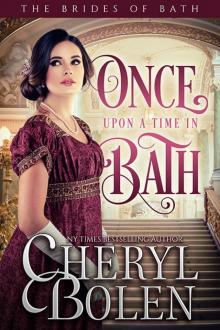 Once Upon a Time in Bath
Once Upon a Time in Bath One Room at the Inn (The Lords of Eton Book 4)
One Room at the Inn (The Lords of Eton Book 4)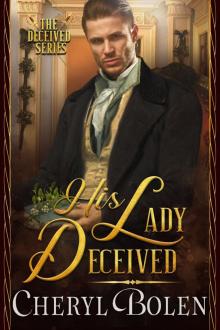 His Lady Deceived
His Lady Deceived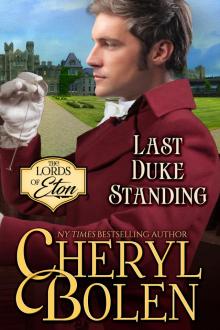 Last Duke Standing
Last Duke Standing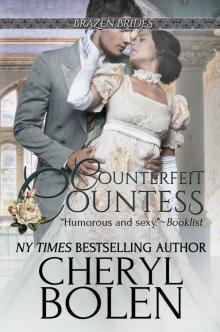 Counterfeit Countess: Brazen Brides, Book 1
Counterfeit Countess: Brazen Brides, Book 1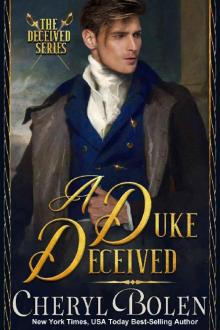 A Duke Deceived (The Deceived Series Book 1)
A Duke Deceived (The Deceived Series Book 1) An Egyptian Affair (The Regent Mysteries Book 4)
An Egyptian Affair (The Regent Mysteries Book 4)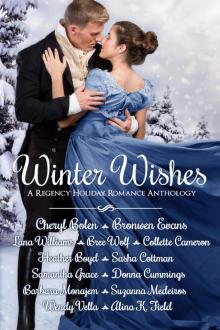 Winter Wishes: A Regency Christmas Anthology
Winter Wishes: A Regency Christmas Anthology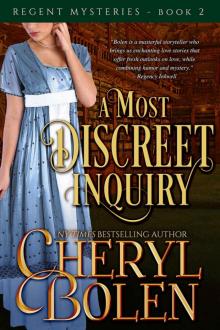 A Most Discreet Inquiry (The Regent Mysteries Book 2)
A Most Discreet Inquiry (The Regent Mysteries Book 2) The Portrait of Lady Wycliff
The Portrait of Lady Wycliff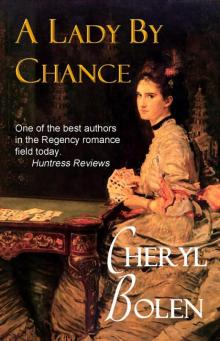 A Lady by Chance (Historical Regency Romance)
A Lady by Chance (Historical Regency Romance)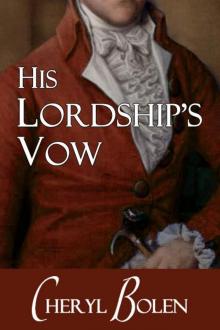 His Lordship's Vow (Regency Romance Short Novel)
His Lordship's Vow (Regency Romance Short Novel)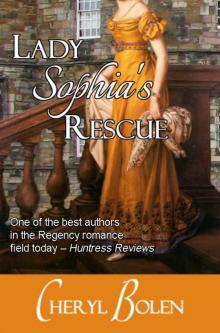 Lady Sophia's Rescue (Traditional Regency Romance)
Lady Sophia's Rescue (Traditional Regency Romance) A Birmingham Family Christmas
A Birmingham Family Christmas Oh What A (Wedding) Night (Brazen Brides #3)
Oh What A (Wedding) Night (Brazen Brides #3) A Christmas In Bath
A Christmas In Bath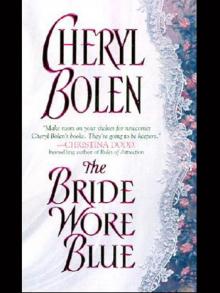 THE BRIDE WORE BLUE
THE BRIDE WORE BLUE Miss Hastings' Excellent London Adventure (Brazen Brides Book 4)
Miss Hastings' Excellent London Adventure (Brazen Brides Book 4)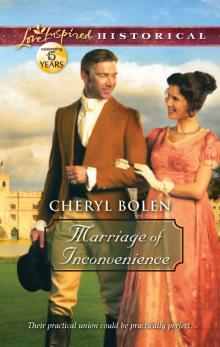 Marriage of Inconvenience
Marriage of Inconvenience Ex-Spinster by Christmas: House of Haverstock, Book 4
Ex-Spinster by Christmas: House of Haverstock, Book 4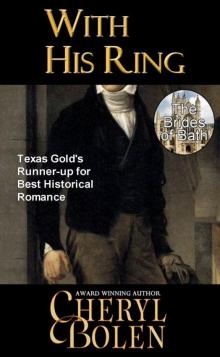 With His Ring (Brides of Bath Book 2)
With His Ring (Brides of Bath Book 2)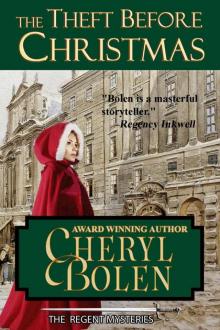 The Theft Before Christmas (The Regent Mysteries)
The Theft Before Christmas (The Regent Mysteries)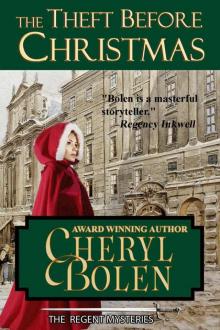 The Theft Before Christmas
The Theft Before Christmas To Take This Lord (The Brides of Bath Book 4)
To Take This Lord (The Brides of Bath Book 4)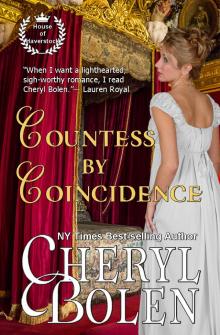 Countess by Coincidence
Countess by Coincidence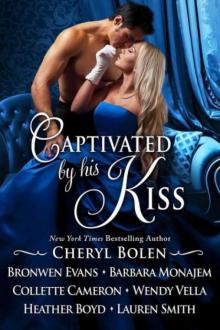 Captivated by His Kiss: A Limited Edition Boxed Set of Seven Regency Romances
Captivated by His Kiss: A Limited Edition Boxed Set of Seven Regency Romances A Birmingham Family Christmas (Brazen Brides Book 5)
A Birmingham Family Christmas (Brazen Brides Book 5)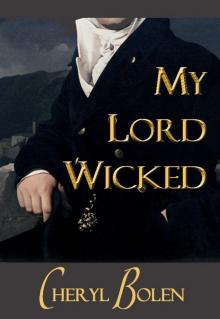 My Lord Wicked (Historical Regency Romance)
My Lord Wicked (Historical Regency Romance) A Duke Deceived
A Duke Deceived The Earl, the Vow, and the Plain Jane
The Earl, the Vow, and the Plain Jane The Bride's Secret
The Bride's Secret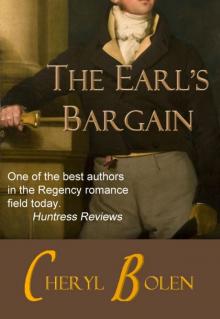 The Earl's Bargain (Historical Regency Romance)
The Earl's Bargain (Historical Regency Romance) Rebels, Rakes & Rogues
Rebels, Rakes & Rogues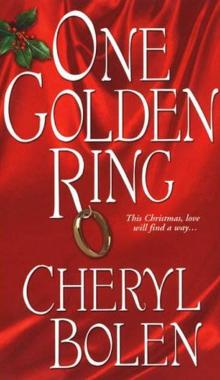 One Golden Ring
One Golden Ring